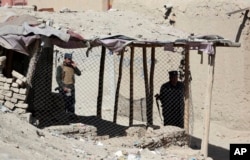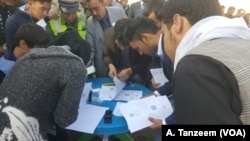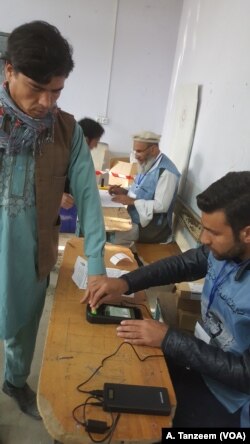Fifteen people were killed and another 60 wounded Saturday when a suicide bomber tried to enter a polling station in northern Kabul.
Eight of the dead were policemen who stopped the attacker at the first security check point, just before he set off his explosives, according to Nasratullah Rahimi, deputy spokesman for Afghan Ministry of Interior.
Saturday’s parliamentary elections in Afghanistan were reportedly marred by sporadic attacks throughout the day, along with reports of long lines and millions of people casting ballots.
The Taliban had issued repeated warnings of attacks on polling stations and all election related activity. The threats, however, were not enough to keep many registered voters home.
“We are not afraid of threats because we want to build our country. Today we had a lot of threats, but we are still here to vote,” said Fariba, a female voter in Kabul.
VOA teams across the country reported a seemingly high turnout, judging by the number of voters at various polling stations.
The chairman of the Independent Election Commission of Afghanistan, Gulajan Bade Sayad, said more than 2 million Afghans had voted in 27 provinces by 2 p.m. local time. The highest turnout, 638,000 votes, was in Kabul. Faryab saw the lowest number of votes cast.
Reports from five other provinces, he said, were not yet available and promised further details later Saturday.
The U.N. Assistance Mission in Afghanistan (UNAMA) said Saturday night that it was encouraged by the large turnout by Afghans to exercise their constitutional right to vote for representatives of their choosing. It also emphasized steps being taken in light of the violence.
"The mission notes the immediate steps taken by the Afghan electoral authorities to ensure that no eligible voter is denied the right to vote due to technical failures: Many polling stations will have extended hours tonight and those that did not open today will be opened tomorrow. The mission also notes that arrangements are being put in place to enable citizens of Kandahar to vote next Saturday, after the polling was postponed due to recent security incidents."
Voting was carried out in 32 of Afghanistan’s 34 provinces. In Kandahar, voting was postponed for a week after Thursday’s killing of influential commander General Abdul Raziq that was claimed by Taliban. Elections in Ghazni were postponed until next year due to political disputes among the local population.
Voting, scheduled to start at 7 a.m. local time, was delayed in several stations due to either the election staff not arriving on time, or technical difficulties with the biometrics system newly introduced in Afghanistan in an effort to reduce fraud. The Independent Election Commission of Afghanistan announced that it would compensate by keeping those sites open until 8 p.m. rather than the scheduled closing time of 4 p.m.
The Election Complaint Commission of Afghanistan expressed concerns over what it called “irregularities” in the process.
Ali Raza Rohani, a spokesman for the ECC, said a delayed start, the late arrival of election material in several places, problems with the biometric system, and the refusal of election staff to allow independent observers or ECC staff inside various polling stations all were matters of concern and would cast a shadow over the legitimacy of the process.
Apart from the suicide attack in Kabul, several other explosions and shootings were reported from various parts of the city. Mohibullah Zeer, the acting spokesman for health ministry, said three people had died and 25 were wounded in those incidents.
In Kunduz, in northern Afghanistan, the Taliban attacked a polling station set up in a school and killed three people, including one IEC official and two policemen. They later set fire to the building. According to Kunduz IEC chief Mohammad Rasul Omar at least seven IEC personnel were missing after the attack.
Marzia Salam Yaftali, head of the Kunduz Hospital, confirmed the three deaths and said 39 others had arrived in the hospital for treatment after suffering attack-related injuries in various parts of the province. Several rocket attacks were also reported in the province throughout the day.
In Nangarhar in eastern Afghanistan, where Islamic State Khorasan Province, the local branch of IS, has a strong presence, 2 civilians were killed and several others were wounded. It was not clear which militant group carried out the attack.
In Baghlan, three mortar shells killed four and wounded several others. In Kunhar province, more than 10 civilians reportedly were wounded.
In several other districts across the country, reports emerged of either shootings, shelling, or small explosions without reports of casualties. News was hard to get from Baghdis where cellphone service was not working.
The last few months in Afghanistan were marred by election related violence. Ten candidates died in various attacks across the country, along with dozens of their supporters, since the beginning of the nomination period in late May.
The government had responded to the security concerns by deploying 70,000 security personnel around the country to safeguard 5,100 polling stations. The original plan was to operate more than 7,000 polling stations but was changed due to security concerns and high threat alerts in several areas.
About 132 observers from various countries and the European Union are joining close to a half-million local observers. Many of them are agents of candidates or political parties, civil society activists, and other groups monitoring the elections.
More than 2,500 candidates are competing for the 249 seats in the next parliament. Some 400 female candidates are among them, competing for 68 seats reserved for women.
Talking to VOA's Afghan service, Hamdullah Mohib, the National Security Adviser of Afghanistan, said the Taliban had been trying to show that Afghans could not handle this process all on their own, but they will be proven wrong.
These are the first elections since the fall of the Taliban that are primarily managed by the Afghan government, including security arrangements.




